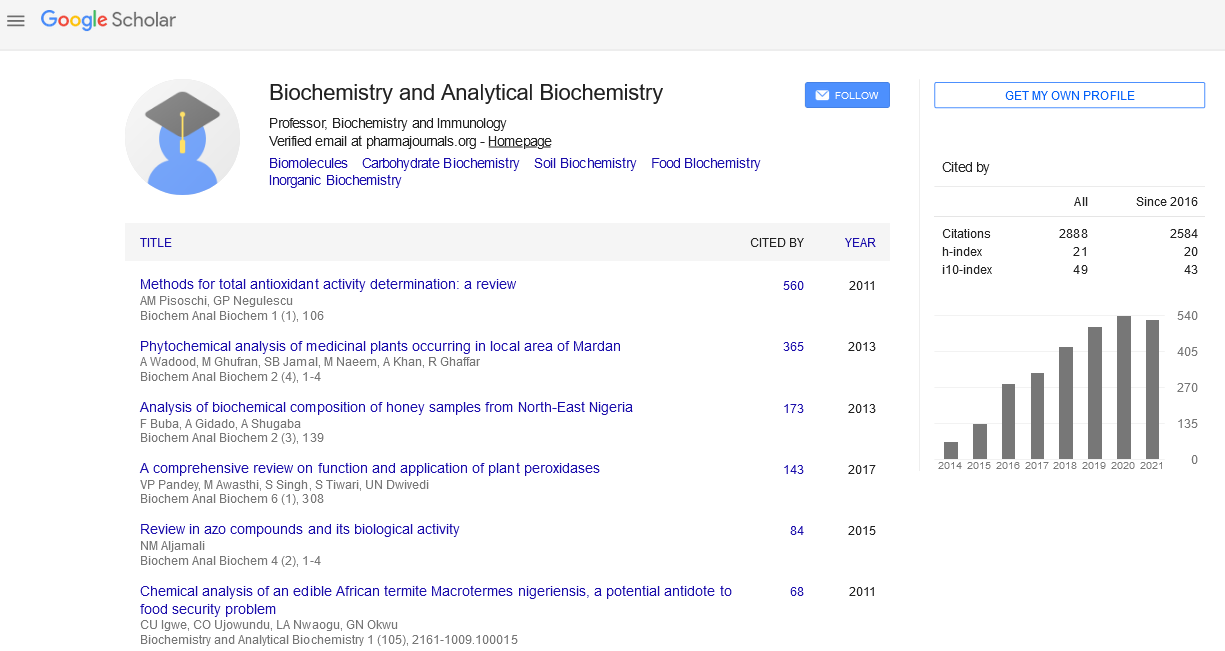Indexed In
- Open J Gate
- Genamics JournalSeek
- ResearchBible
- RefSeek
- Directory of Research Journal Indexing (DRJI)
- Hamdard University
- EBSCO A-Z
- OCLC- WorldCat
- Scholarsteer
- Publons
- MIAR
- Euro Pub
- Google Scholar
Useful Links
Share This Page
Journal Flyer

Open Access Journals
- Agri and Aquaculture
- Biochemistry
- Bioinformatics & Systems Biology
- Business & Management
- Chemistry
- Clinical Sciences
- Engineering
- Food & Nutrition
- General Science
- Genetics & Molecular Biology
- Immunology & Microbiology
- Medical Sciences
- Neuroscience & Psychology
- Nursing & Health Care
- Pharmaceutical Sciences
Abstract
Hematological Responses and Percentage Parastaemia in Malaria-Infected Mice Treated with Ethanol Extract of Zapoteca portoricensis Roots
Joshua Parker E, Ugwuoke Mary C, Nwodo Okwesili FC and Uroko Robert Ikechukwu
The increasing use of Zapoteca portoricensis roots in the treatment of malaria has necessitated the need to assay for the haematological responses and parasitaemia levels in malaria-infected mice treated with ethanol extract of Zapoteca portoricensis roots. This was done by determining the percentage parasitaemia and some haematological parameters such as packed cell volume (PCV), haemoglobin concentration (Hb), total white blood cell count (TWBC) and red blood cell count (RBC). The Zapoteca portoricensis roots were randomly collected from Umabor Ehalumona, Nsukka, Enugu State, Nigeria. Treatment of infected mice with the ethanol extract of Zapoteca portoricensis roots caused mean percentage parasitaemia to reduce significantly (p < 0.05) in groups 4, 5 and 6 administered 100, 200 and 300 mg/kg b.w. of the extract respectively when compared to the group 2 mice (malaria untreated). Haematological parameters such as PCV, Hb concentration and RBC count significantly (p < 0.05) increased in groups 4, 5 and 6 administered 100, 200 and 300 mg/kg b.w. of the extract respectively when compared to group 2 (malaria untreated) but TWBC count did not change significantly (p > 0.05) in the controls, group 1 (normal control), groups 2 (malaria untreated) and 3 administered 28 mg/kg b.w. of artemether and lumefantrine and test groups 4 and 6 administered 100 and 300 mg/kg b.w. of the extract respectively. The investigation validated the use of the root extract of Zapoteca portoricensis in the treatment of malaria in traditional medicine.


